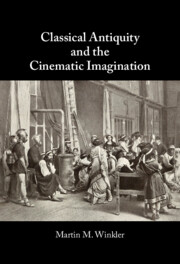Book contents
- Classical Antiquity and the Cinematic Imagination
- Classical Antiquity and the Cinematic Imagination
- Copyright page
- Dedication
- Contents
- Illustrations
- Preface
- I Prolegomena
- II Progymnasmata: Ways of Seeing
- III Complex Cinematism
- Chapter 4 Motion Images in Ecphrases
- Chapter 5 Shadows and Caves: The Cinema as Platonic Idea and Reality
- Chapter 6 Static Flight: Zeno’s Arrow and Cinematographic Motion
- Chapter 7 Lucretius: Dream Images and Beyond the Infinite
- Chapter 8 The Cinematic Nature of the Opening Scene in Heliodorus’ An Ethiopian Story
- Chapter 9 The Face of Tragedy: Mask and Close-Up
- IV The Cinema Imagines Difficult Texts
- V Epilegomena
- Bibliography
- Index
Chapter 5 - Shadows and Caves: The Cinema as Platonic Idea and Reality
from III - Complex Cinematism
Published online by Cambridge University Press: 15 February 2024
- Classical Antiquity and the Cinematic Imagination
- Classical Antiquity and the Cinematic Imagination
- Copyright page
- Dedication
- Contents
- Illustrations
- Preface
- I Prolegomena
- II Progymnasmata: Ways of Seeing
- III Complex Cinematism
- Chapter 4 Motion Images in Ecphrases
- Chapter 5 Shadows and Caves: The Cinema as Platonic Idea and Reality
- Chapter 6 Static Flight: Zeno’s Arrow and Cinematographic Motion
- Chapter 7 Lucretius: Dream Images and Beyond the Infinite
- Chapter 8 The Cinematic Nature of the Opening Scene in Heliodorus’ An Ethiopian Story
- Chapter 9 The Face of Tragedy: Mask and Close-Up
- IV The Cinema Imagines Difficult Texts
- V Epilegomena
- Bibliography
- Index
Summary
This chapter juxtaposes Plato’s Cave Allegory and our visual media. Plato’s detailed text, in which Socrates describes the projection of shadows onto a wall by means of firelight, readily lends itself to a cinematic understanding. Various film theorists, directors, and cinematographers have pointed to this analogy for their own approaches to cinema. Henri Bergson was the first to incorporate the Cave Allegory into his philosophy of the cinematographic mind. The chapter traces such a development from the birth of cinema until today, e.g. in texts by Maxim Gorky, Susan Sontag, and others. Specific films, such as Chris Marker’s La Jetée and Bernardo Bertolucci’s The Conformist, address the Platonic symbolism of light and shadow as stages of knowledge or enlightenment. Related to this topic is the power of moving images (e.g. in A Clockwork Orange), the question of their truth or reliability (documentaries, “fake news”), and their relation to historical memory (Agnès Varda, Marcel Ophuls).
Keywords
- Type
- Chapter
- Information
- Classical Antiquity and the Cinematic Imagination , pp. 156 - 214Publisher: Cambridge University PressPrint publication year: 2024



